When it comes to selling food and specialty food products to chains, like supermarkets it’s essential to approach the process with consideration and industry understanding. In this video training we will provide you with tips and strategies for successfully entering the retail market with your food products. As the founder of Retail MBA, I have personally experienced selling millions of units to retailers and have taught countless companies how to effectively sell their products to retail chains. So lets delve into the world of the food and specialty food industry while exploring points to bear in mind when approaching retailers.
Understanding the Food Industry
Selling food and specialty food items has its complexities. Since you’re dealing with products that people consume there are regulations and requirements that must be adhered to. The Food and Drug Administration (FDA) has laid out guidelines for labeling for organic products. It is crucially important to familiarize yourself with these regulations in order to ensure compliance and maintain retailers trust as they prioritize product safety and quality.
Researching Retailer Requirements
Before approaching retailers conducting research, on their requirements is vital. It’s important to understand what each retailer expects from suppliersMany retailers have their own vendor portals or websites where they outline the information and standards they require from their suppliers. For instance if you’re interested, in selling your products at Safeway grocery store a quick Google search for “Safeway vendor” will lead you to their vendor website. This platform offers details on what Safeway expects in terms of product specifications, labeling and compliance. It’s important to familiarize yourself with these requirements to prevent issues or rejections in the future.
Compliance with local regulations is absolutely crucial when it comes to selling food products. This entails ensuring that your products meet all labeling requirements, nutritional statements and any other regulations specific to your product category. Before launching your products into the market conducting research, on the regulations is essential. By doing you can avoid complications and maintain the trust of both retailers and consumers.
To make your product stand out in the food industry it’s vital to differentiate it through packaging. Take some time to visit stores and observe products within your category. Pay attention to their packaging design choices the language used on them and how they set themselves apart from competitors.
This market research will provide you with insights, into what’s effective and what isn’t in terms of packaging. Remember, packaging plays a role in attracting customers and boosting sales. It might be worth considering investing a bit more in your packaging to leave a lasting impression on retailers and consumers.
Educating yourself about the industry is crucial for selling food products to retailers. There are resources such as books and trade shows that can offer valuable insights into the specialty food industry. One recommended resource is the book “Specialty Food Retailers,” which provides guidance on selling specialty food products to retailers. Additionally attending trade shows like the Fancy Food Show can give you an understanding of the industry your competition and current trends. By immersing yourself in the industry you will be well prepared to make decisions and navigate the complexities of selling food products to retailers.
Considering collaboration with distributors can often prove beneficial when selling food products to retailers. Distributors act as intermediaries between you and the retailers taking care of tasks such, as shipping, delivery logistics and organization management.
Distributors may charge a fee for their services. They offer convenience and accessibility, for retailers to access your products. However it’s important to consider this fee when setting the price for your products.
Take into account food items
If you’re selling foods like fresh produce or dairy products it’s crucial to consider the logistics and timing involved. Grocery chains have an advantage in sourcing goods quickly. Therefore it’s essential to ensure that your products are of quality and have a shelf life to prevent spoilage. Retailers will provide guidance on shipment destinations and any specific requirements they have. It’s important to plan and coordinate accordingly to meet their expectations.
Invest in packaging
The packaging of your food products plays a role in their success. In a market having eye catching packaging with design can make a difference, in attracting customers and boosting sales. Take the time to create packaging that stands out from competitors while effectively conveying the selling points of your product. Remember that packaging is often the impression consumers have of your product so investing in high quality packaging that reflects your brands value is worthwhile.
Market Research
Prior, to reaching out to retailers it’s essential to conduct market research and be thoroughly prepared. Gain an understanding of the regulations and compliance standards that are applicable to your food products. Familiarize yourself with the requirements of the retailers you intend to approach. Take the time to visit stores and carefully examine products in your category in order to comprehend packaging differentiation. Educate yourself about the industry through resources such as books and trade shows. Consider collaborating with distributors to streamline the process of selling your products to retailers. Take into account the aspects and timing involved when selling foods. Invest in top notch packaging that will leave a lasting impression on both retailers and consumers.
By following these tips and strategies you will be well prepared for navigating the intricacies of selling food products to chains. Remember, thorough market research is crucial compliance with regulations is vital and product differentiation through packaging is key. With preparation and a solid understanding of the industry you can confidently approach, pitch. Successfully sell your food products to retailers.
To gain insights on selling to chains consider signing up for a complimentary training webinar at retailmba.com. Retail MBA offers programs and coaching services designed to support companies in their journey towards scaling up and achieving growth. For information on their services well, as success stories please visit retailmb.com.
Make sure you stay connected by subscribing to the Retail MBA channel and don’t forget to like and share their content. They’re always coming up with material to help you along your journey.
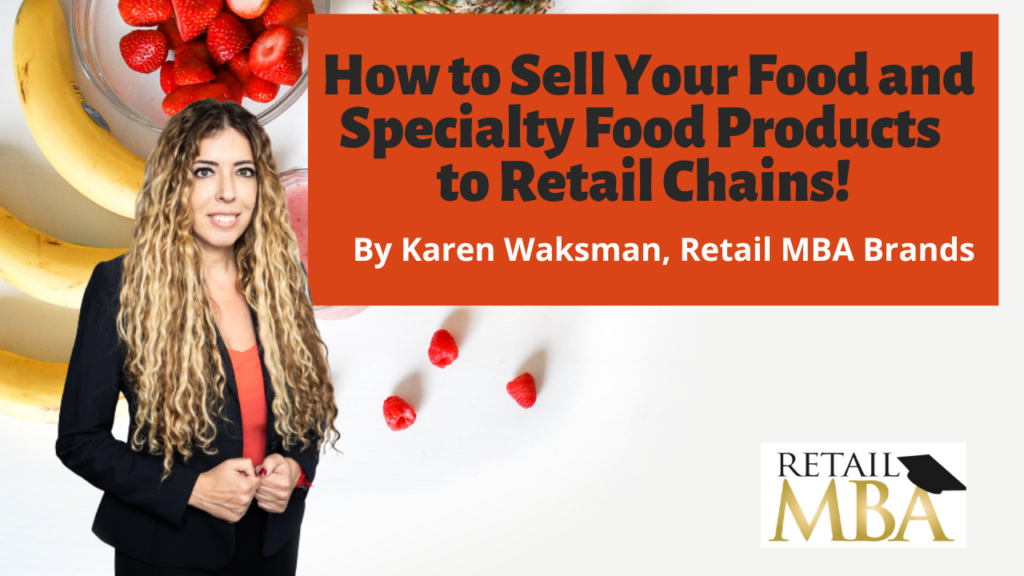
Transcript Outline on How to Sell Food and Specialty Food Products to Retail
A Helpful Guide, to Selling Food and Specialty Food Products to Retail Chains
When it comes to getting your food or specialty food products into supermarkets and retail chains there are factors you need to consider and plan for. In this article I’ll share some insights on how to approach the industry.
Karen Waksman, an expert in selling millions of units to retailers worldwide offers her expertise and actionable strategies for successful sales in retail chains. With over 11 years of teaching and supporting thousands of companies globally in selling their products through channels such as stores and catalogs Karen has gained extensive knowledge of the retail industry.
Understanding Karen Waksmans Expertise
Karen Waksmans expertise stems from her experience as a manufacturers representative. She has achieved success by selling millions of units to retailers. Additionally she has dedicated her career to assisting aspiring entrepreneurs in achieving their dreams of placing their products on store shelves through her platform Retail MBA.
Navigating the Food and Specialty Food Industry
Selling food and specialty food products poses challenges due, to the nature of this industry.It is crucial to ensure compliance, with FDA labeling requirements and understand certifications well as adhere to federal and local regulations. Retailers often have requirements for suppliers, which can be easily found through a Google search for vendor information pertaining to a particular retailer.
To establish a partnership with retailers it is important to familiarize yourself with the guidelines and regulations related to your product category.
Before launching your food product conducting market research is of importance. Visiting stores that carry products can provide insights into packaging design choices, product descriptions and key selling points. By examining what already exists on store shelves you can identify gaps in the market that opportunities for differentiation. Online research is also valuable for understanding industry regulations and gathering information from experts who have authored books on selling specialty food products to retailers. Utilizing these resources will enrich your knowledge of the aspects of the industry.
In the food sector it is common to work alongside distributors who act as intermediaries between suppliers and retailers by purchasing goods from manufacturers before reselling them. It is important to note that while distributors simplify the process for retailers their services typically come at a cost.
Therefore it is vital to consider these expenses when contemplating collaboration, with distributors. However,
In situations there may be no need to work with distributors, for product categories. Instead it is possible to establish relationships with retailers. When it comes to selling food items, careful planning and meticulous consideration are crucial.
Grocery chains have an advantage in handling goods because of their experience in sourcing products regionally. Therefore it is important to focus on ensuring product quality, appropriate shelf life and timely delivery.
To succeed in the market it is essential to familiarize yourself with the shipping requirements of retailers and their ability to access product sources. This knowledge can greatly impact your success.
Packaging for Food Products
Packaging plays a role in the success of specialty food products. It is important to make your merchandise stand out from competitors by using informative packaging. Investing in high quality packaging materials that effectively convey the uniqueness and value of your product is crucial. Remember that packaging often shapes customers first impression of your item and influences purchase decisions.
To gain an understanding of trends in the food industry consider participating in educational initiatives such as attending renowned trade shows like the prestigious Fancy Food Show. These events provide opportunities to learn about industry competitors and stay updated on emerging trends, in your field.
Networking with professionals becomes effortless when actively participating in these exhibitions, which increases your chances of achieving success. To sum up successfully selling food and specialty items, to chains requires market research, strict adherence to regulations a deep understanding of distributor relationships, emphasis on superior packaging solutions and staying updated on industry trends. It is crucial for entrepreneurs to have access to Karen Waksmans expertise and insights as they provide guidance on navigating the complexities of the food industry establishing partnerships with chains and differentiating products in the market. By implementing the strategies and advice outlined in this article entrepreneurs can significantly improve their chances of securing collaborations with chains and achieving success, in the competitive food industry.

Step-by-step training on how to sell to retail chains!
We explain exactly how to do that and how to get started today. I’ve taught over 100,000 of companies over the years across the globe on how to get your products to the stores. And so we’re here to support you. Or please subscribe to our Youtube channel and or be on the lookout for additional training that we create.
We are here to expedite the process of generating revenue with your physical products and that’s what we’re all about. Take a look at our advanced training, live events, certification programs and so much more.
In this training, I will discuss some of the things to think about when approaching a retailer to sell your products and become a vendor. Hope it helps! 🙂
Karen Waksman,
Retail MBA
Questions? Contact Us!
1-855-Retail-2 (Call or Text)
Email: info@retailmba.com
Retail MBA provides a step-by-step formula on How to Sell to Major Retailers, Online Retailers, Smaller Retailers, Catalogs and More. No Experience Required! These solutions continue to convert for clients year-over-year! These are Time-Tested and Proven Strategies that we utilize ourselves when going after stores! Everything we teach, we test. Want access to these formulas? ANY one of our programs and coaching systems gives you access to them now. With that said…
Here are 5 Easy Ways to Work with Us:
1) Free Training – If You Would Like to Join Our Next FREE Webinar Training Called “Retail Chain Store Secrets – How to Sell to Major Retail Chains. No Experience Required” Then Sign Up NOW To Learn All About Selling into Retail Chains By Clicking Here!
2) Retail MBA Year Long Coaching and Training System – Our Year Long Coaching and Training System with Karen Waksman is POWERFUL! This is our most popular training and coaching system! We walk you through how to approach, pitch and sell to retail chains and we coach you along the way! Join us by Clicking Here!
3) Masterclass Intensives – Want to Join our Next 4 Week Elite Retail MBA Masterclass Intensive? These Intensives Are EPIC for people who Love Fast Paced Learning – Homework, Retail Coaching, Developing Your Strategy, Buyers Contacts and More! These Events Are Held Every Quarter. Join us by Clicking Here!
4) Done-for-You Program – If You Want Karen Waksman and Her Team to Reach Out to Your Top Dream Retail Chains On Your Behalf – And You Have a Retail-Ready Product, Check Out our Epic Done-For-You Service by Clicking Here!
5) In Person Events – If You Want to Learn LIVE and Meet Karen Waksman in Person at Our Next “America’s Next Retail Product: LIVE Event with Other Like-Minded Individuals in Beautiful San Diego, CA! We Would LOVE to Have You Join Us by Clicking Here!
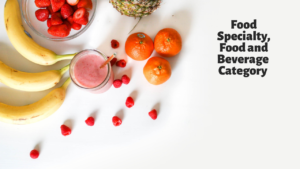
Check Out Our Additional Blog Posts Here:
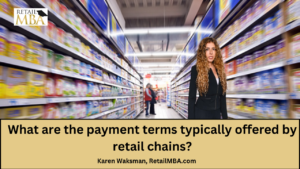
Retail Terms
Retail Terms – What are the payment terms typically offered by retail chains? Click Here to Learn More!
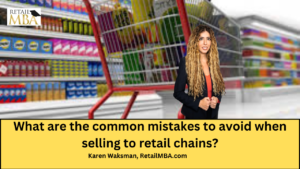
Retail Vendor
Retail Vendor – What are the common mistakes to avoid when selling to retail chains? Click Here to Learn More!

How to Sell Your Holiday Products to Retail Chains
New Training on How to Sell Your Holiday Products to Retail Chains
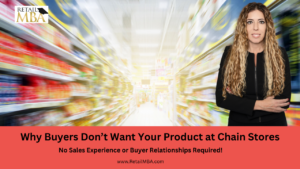
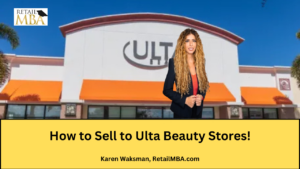
Ulta Beauty Vendor
Ulta Beauty Vendor – How to Sell to Ulta Beauty Stores. Click Here to Learn More!
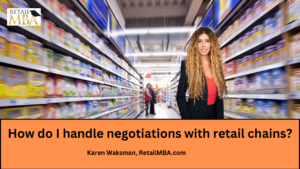
Retail Strategy
Retail Strategy – How do I handle negotiations with retail chains? Click Here to Learn More!
